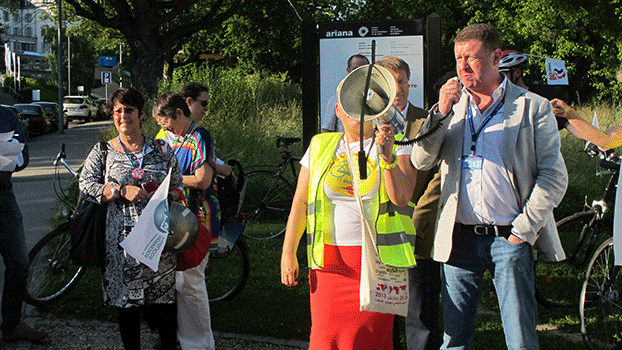
A recent report suggests that Russia still has a long way to go when it comes to ensuring trade unions’ place in society
In the mid-twentieth century freedom of association was internationally recognized as a basic human right and a fundamental principle of the International Labour Organization. In the modern world, workers’ rights to form trade unions and engage in collective bargaining are rarely challenged openly but often ignored in practice. As before, employees trying to exercise this right are likely to face government and employer pressure and legal obstacles.
Russia’s laws and constitution guarantee freedom of association, including the right to form trade unions for advancing workers’ interests and the freedom to set up and run non-governmental associations.
Russia ratified the ILO’s fundamental Conventions No. 87 and No. 98 concerning freedom of association and collective bargaining and the right of all workers and entrepreneurs to form and join organizations without previous authorization, thereby making a commitment to respect the said principles and rights.
Yet throughout modern Russian history trade unions have faced problems with carrying out their daily activities, since despite recognizing the rights stipulated in the ILO Conventions Russia has failed to provide adequate mechanisms supporting their implementation.
Unlike many European countries in which trade unions emerged and developed in a consistent manner over time, Russia’s trade union movement has an unusual history.
In the Soviet period, the government suppressed any attempts at worker solidarity actions or the creation of independent organizations. It was only at the turn of the 1980s and 1990s that Russia saw a revival of the labour movement and independent grassroots unions, marked by mass strikes, rallies, and speeches, which contributed greatly to the overall democratization of society.
In the post-Soviet era trade union roles and objectives went through a major revision, but are still the most numerous of nongovernmental entities in Russia. A particularly good example is the Russian Confederation of Labour, (KTR), a national association established in 1995, which brought together the country’s independent unions. KTR’s membership includes more than 20 national and interregional trade unions.
Like other nongovernmental organizations in Russia, independent unions face difficulties such as undue employer and state interference in union activity, barriers to collective bargaining, discrimination against union members, limited opportunities to set up and register new organizations, disproportionate restrictions on the right to strike, and sometimes pressure, persecution, criminal charges, and violent attacks against trade unionists.
General Overview of Freedom of Association in Russia, 2015–2018
In what follows we present a compilation of data illustrating the practical application of the principles of freedom of association in Russia from 1 January 2015 through 31 March 2018. The information collected over the course of monitoring infringements against trade union rights and freedom of association has been compiled and analysed by the Centre for Social and Labour Rights, an independent non-profit organisation, and by the Confederation of Labour of Russia, a nationwide Russian trade union association.
Instances of infringement were recorded by trade union associations that are members of the Confederation of Labour of Russia and subsequently categorized under uniform descriptive categories and codified for the purpose of the following analysis.
Information on165 instances of infringement of trade union rights was analysed over the duration of the monitoring
All of this information on infringements was systematically classified (based on provisions of the fundamental ILO Conventions) into five basic categories:
- Infringements of trade union rights and civil freedoms;
- Infringements of the ILO Convention concerning Freedom of Association and the Right to Organize, 1948 (No. 87);
- Infringements of the ILO Convention concerning the Application of the Principles of the Right to Organize and to Bargain Collectively, 1949 (No. 98);
- Infringements of the ILO Convention concerning Protection and Facilities to be Afforded to Workers’ Representatives in the Undertaking, 1971 (No. 135);
- Infringements of the right to provide consultations.
Each of the categories listed incorporates specific types of infringement, and in any particular case there may be several infringements affecting the various rights and guarantees stipulated by the Conventions.
To date, trade union associations have gathered information on infringements that fit into each of the five categories listed above. This outcome testifies to the fact that despite official declarations of the importance of the rights stipulated in these Conventions, problems in ensuring the exercise or those rights have not been resolved in practice.
Trade union organizations have provided information testifying to the existence of an extremely broad spectrum of problems with exercising their right to freedom of association.
Trade unions also face obstacles to their everyday operations. There are problems with restrictions in creating and registering organizations; interference by employers and others in trade union activities; restrictions on conducting collective bargaining; discrimination against trade union members; and unreasonable limitations on the right to strike.
As one way of characterizing the overall situation, there are reports of serious pressure and persecution including even imprisonment and physical violence against trade union activists along with attempts to dissolve trade unions.
Over the last three years trade unions have provided:
- 21 reports related to Convention No. 87;
- 98 reports related to Convention No. 98;
- 19 reports related to Convention No. 135;
- 26 reports of infringements of trade union rights and civil freedoms;
- 1 report of an infringement of the right to provide consultations.
The proportions (by percentage) of reported infringements against trade union rights and civil liberties arranged according to the groups of rights and freedoms are shown below in Figure 1.